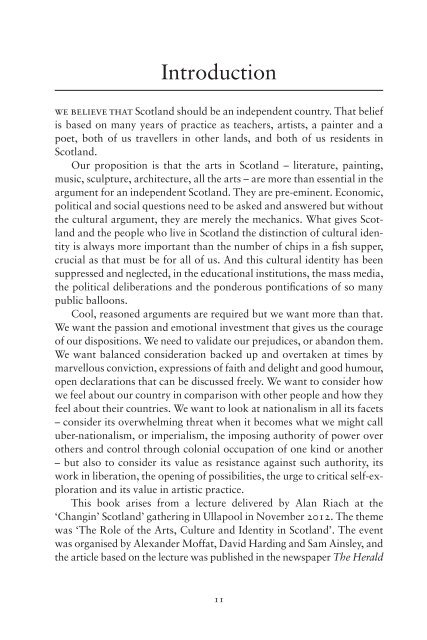Arts of Independence by Alexander Moffat and Alan Riach sampler
ALEXANDER MOFFAT and ALAN RIACH take a hard look at the most neglected aspect of the argument for Scotland’s distinctive national identity: the arts. Their proposition is that music, painting, architecture and, pre-eminently, literature, are the fuel and fire that makes imagination possible. Neglect them at your peril. For Moffat and Riach, jobs, health and trade are matters of material fact that need to be enlivened by imagination. How can we organise society to help us approach what the arts have to give. Why have we been so poor at representing our arts comprehensively, both within Scotland and internationally? What can be done? How might things be different? The arts are of paramount importance in the modern world. Moffat and Riach take the argument out of the hands of politicians and economists and beyond the petty squabbles of party politics.
ALEXANDER MOFFAT and ALAN RIACH take a hard look at the most neglected aspect of the argument for Scotland’s distinctive national identity: the arts. Their proposition is that music, painting, architecture and, pre-eminently, literature, are the fuel and fire that makes imagination possible. Neglect them at your peril. For Moffat and Riach, jobs, health and trade are matters of material fact that need to be enlivened by imagination. How can we organise society to help us approach what the arts have to give. Why have we been so poor at representing our arts comprehensively, both within Scotland and internationally? What can be done? How might things be different? The arts are of paramount importance in the modern world. Moffat and Riach take the argument out of the hands of politicians and economists and beyond the petty squabbles of party politics.
- No tags were found...
Create successful ePaper yourself
Turn your PDF publications into a flip-book with our unique Google optimized e-Paper software.
Introduction<br />
we believe that Scotl<strong>and</strong> should be an independent country. That belief<br />
is based on many years <strong>of</strong> practice as teachers, artists, a painter <strong>and</strong> a<br />
poet, both <strong>of</strong> us travellers in other l<strong>and</strong>s, <strong>and</strong> both <strong>of</strong> us residents in<br />
Scotl<strong>and</strong>.<br />
Our proposition is that the arts in Scotl<strong>and</strong> – literature, painting,<br />
music, sculpture, architecture, all the arts – are more than essential in the<br />
argument for an independent Scotl<strong>and</strong>. They are pre-eminent. Economic,<br />
political <strong>and</strong> social questions need to be asked <strong>and</strong> answered but without<br />
the cultural argument, they are merely the mechanics. What gives Scotl<strong>and</strong><br />
<strong>and</strong> the people who live in Scotl<strong>and</strong> the distinction <strong>of</strong> cultural identity<br />
is always more important than the number <strong>of</strong> chips in a fish supper,<br />
crucial as that must be for all <strong>of</strong> us. And this cultural identity has been<br />
suppressed <strong>and</strong> neglected, in the educational institutions, the mass media,<br />
the political deliberations <strong>and</strong> the ponderous pontifications <strong>of</strong> so many<br />
public balloons.<br />
Cool, reasoned arguments are required but we want more than that.<br />
We want the passion <strong>and</strong> emotional investment that gives us the courage<br />
<strong>of</strong> our dispositions. We need to validate our prejudices, or ab<strong>and</strong>on them.<br />
We want balanced consideration backed up <strong>and</strong> overtaken at times <strong>by</strong><br />
marvellous conviction, expressions <strong>of</strong> faith <strong>and</strong> delight <strong>and</strong> good humour,<br />
open declarations that can be discussed freely. We want to consider how<br />
we feel about our country in comparison with other people <strong>and</strong> how they<br />
feel about their countries. We want to look at nationalism in all its facets<br />
– consider its overwhelming threat when it becomes what we might call<br />
uber-nationalism, or imperialism, the imposing authority <strong>of</strong> power over<br />
others <strong>and</strong> control through colonial occupation <strong>of</strong> one kind or another<br />
– but also to consider its value as resistance against such authority, its<br />
work in liberation, the opening <strong>of</strong> possibilities, the urge to critical self-exploration<br />
<strong>and</strong> its value in artistic practice.<br />
This book arises from a lecture delivered <strong>by</strong> <strong>Alan</strong> <strong>Riach</strong> at the<br />
‘Changin’ Scotl<strong>and</strong>’ gathering in Ullapool in November 2012. The theme<br />
was ‘The Role <strong>of</strong> the <strong>Arts</strong>, Culture <strong>and</strong> Identity in Scotl<strong>and</strong>’. The event<br />
was organised <strong>by</strong> <strong>Alex<strong>and</strong>er</strong> M<strong>of</strong>fat, David Harding <strong>and</strong> Sam Ainsley, <strong>and</strong><br />
the article based on the lecture was published in the newspaper The Herald<br />
11


















